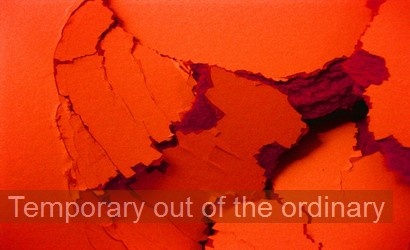Perfect Failure
18/12/14

Most of us know this recipe for complete failure: we have a chip on our shoulder, sometimes morphing into a judgmental monkey, and if we are religious, it may even be some godly authority that tells us that we have to do better, be better, that we actually should be no less than perfect. Which makes us relentlessly find fault in ourselves . . . a task in which we excel! Often to near perfection! Which in turn provides us with all the nightmares we never wished for. And a consistent effort to hide our low self-esteem.
Now, what kind of attitude towards life is that? Let's look at it another way ...
Once there was a TV show in the country of Wonderland that celebrated failures with never-ending fervor: The PERFCT ENTERPRISE OF SELF-DESTRUCTION was immensely popular and ran for years. Their patron was the master of failures himself: Don Quijote, who couldn't be stopped at failing with style throughout his whole life and so became a prominent figure in world literature. Credits were given at the beginning of each show to successfully failing people in history like composer Franz Liszt and classical pianist Arthur Rubinstein who both considered early on in their life the career of being a virtuoso too dull an enterprise to live for and tried to hang themselves . . . and failed which gave them another life immediately and eventually the fame they initially loathed.
This Is The Very Perfection Of A Man, To Find Out His Own Imperfections.
The show had a simple concept. Through several rounds candidates of all walks of life gave a short account of failures in their life and smartphoners could vote them into the next round or consider their failings a flop. At the end a winner was named a Master of Failure and the runner up a Talent to Fail. The prices they got were failures, too, so we don't mention them here.
The crowd loved the show and it was franchised to more countries than are listed in the UN. Rumors about selling it to other galaxies could not be confirmed. Just a guess: they failed.
Here is the story: by not wanting to fail we already fail. No risk, no interesting experiences, no learning opportunity. We learn through experiences and we don't mean the experience of repetitive routine which in itself is an underrated flop of extraordinary magnitude. Just slightly more subtle is the constant blunder to impress or convince people from our infallible greatness. Interesting experiences always contain a quality of unknown territory, like talking to people we don't know.
Why would we ever doubt our own fullness?
On any cloudless night sky we can look at the moon in its various states. Only one time every 28 days we may marvel at its fullness – which is already fading. Every other phase like a half - or new moon or anything in between would never make us believe that this is the whole thing. We know it is a temporary game of light that invites us to watch different aspects of it until we may enjoy its fullness - again.
Why would we ever doubt our own fullness? Why would we see our own mishaps and stumbles as anything else but just temporary facets of our fullness? Why would we stop learning, risking, creating, growing?
There is an inherent knowledge of perfection inside and all around us that includes imperfection to stimulate our permanent growth - there is no end to developing. Before we die, let's risk a few things, as proposed by these famous failures.

Comments
You must be logged in to post comments in the magazine.
There are no comments in this article yet.